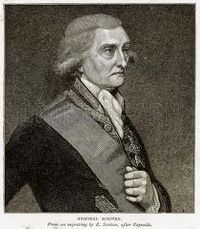Annotation:Glorious 12th of April: Difference between revisions
No edit summary |
m Text replacement - "garamond, serif" to "sans-serif" |
||
| (2 intermediate revisions by 2 users not shown) | |||
| Line 1: | Line 1: | ||
'''Back to [[{{BASEPAGENAME}}]]''' | =='''Back to [[{{BASEPAGENAME}}]]'''== | ||
---- | ---- | ||
<p><font face=" | <p><font face="sans-serif" size="4"> | ||
'''GLORIOUS 12TH OF APRIL'''. AKA - "[[Rodney for Ever]]." English, Country Dance Tune (2/4 time). B Flat Major. Standard tuning (fiddle). AABB. The tune appears to be unique to Samuel, Ann and Peter Thompson's '''Compleat Collection''', vol. 5 (London | '''GLORIOUS 12TH OF APRIL'''. AKA - "[[Rodney for Ever]]." English, Country Dance Tune (2/4 time). B Flat Major. Standard tuning (fiddle). AABB. The tune appears to be unique to Samuel, Ann and Peter Thompson's '''Compleat Collection''', vol. 5 (London, 1788). The alternate title given by the Thompsons, "Rodney for Ever", confirms that the tune celebrates Admiral Sir George Rodney's victory at the Battle of the Saintes [http://en.wikipedia.org/wiki/Battle_of_the_Saintes], April 12, 1782. The engagement was fought in the West Indies, off Guadeloupe, and involved the same French fleet that blockaded the British at Yorktown during the American Revolution. The victory prevented a planned invasion of Jamaica.[[File:rodney2.jpg|200px|thumb|right|Admiral Rodney]] | ||
[[File:saintes.jpg|200px|thumb|left|Battle of the Saintes]] | [[File:saintes.jpg|200px|thumb|left|Battle of the Saintes]] | ||
On his return to Britain, Rodney was made a peer and was awarded an annual pension of £2,000. He lived in retirement until his death in 1792. | On his return to Britain, Rodney was made a peer and was awarded an annual pension of £2,000. He lived in retirement until his death in 1792. | ||
| Line 11: | Line 11: | ||
<br> | <br> | ||
</font></p> | </font></p> | ||
<p><font face=" | <p><font face="sans-serif" size="4"> | ||
''Source for notated version'': | ''Source for notated version'': | ||
<br> | <br> | ||
<br> | <br> | ||
</font></p> | </font></p> | ||
<p><font face=" | <p><font face="sans-serif" size="4"> | ||
''Printed sources'': Thompson ('''Compleat Collection of 200 Favourite Country Dances, vol. 5'''), 1788; No. 139, p. 70. | ''Printed sources'': Thompson ('''Compleat Collection of 200 Favourite Country Dances, vol. 5'''), 1788; No. 139, p. 70. | ||
<br> | <br> | ||
<br> | <br> | ||
</font></p> | </font></p> | ||
<p><font face=" | <p><font face="sans-serif" size="4"> | ||
''Recorded sources'': <font color=teal></font> | ''Recorded sources'': <font color=teal></font> | ||
</font></p> | </font></p> | ||
| Line 27: | Line 27: | ||
<br> | <br> | ||
---- | ---- | ||
'''Back to [[{{BASEPAGENAME}}]]''' | =='''Back to [[{{BASEPAGENAME}}]]'''== | ||
Latest revision as of 12:52, 6 May 2019
Back to Glorious 12th of April
GLORIOUS 12TH OF APRIL. AKA - "Rodney for Ever." English, Country Dance Tune (2/4 time). B Flat Major. Standard tuning (fiddle). AABB. The tune appears to be unique to Samuel, Ann and Peter Thompson's Compleat Collection, vol. 5 (London, 1788). The alternate title given by the Thompsons, "Rodney for Ever", confirms that the tune celebrates Admiral Sir George Rodney's victory at the Battle of the Saintes [1], April 12, 1782. The engagement was fought in the West Indies, off Guadeloupe, and involved the same French fleet that blockaded the British at Yorktown during the American Revolution. The victory prevented a planned invasion of Jamaica.


On his return to Britain, Rodney was made a peer and was awarded an annual pension of £2,000. He lived in retirement until his death in 1792.
The use of Rodney as a first name originates with the admiral. It became a popular name for boys at the end of the eighteenth century [wikipedia]. See also the Thompson's second tune commemorating the victory, "Admiral Rodney's Triumph."
Source for notated version:
Printed sources: Thompson (Compleat Collection of 200 Favourite Country Dances, vol. 5), 1788; No. 139, p. 70.
Recorded sources:
